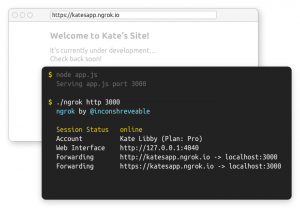There are a lot open-source domotica systems available like Calaos, Domoticz, Home Assistant and OpenHab to name a few. Now there is one more, my own (for now) nameless system. Why make your own I hear you asking! First of all because I want to learn how to create such thing from the ground up, and I want to find out how I would build such system without being influenced by other domotica systems. I haven’t checked any source code of my direct competitors and I haven’t checked how they solved various issues. I googled some of their interfaces and in most cases I hope I can do it better. Because in my opinion most of them look really outdated! In this blog I want to show you what I have build so far. Keep in mind it is by far not yet ready or usable.
Category Archives: Linux
Linux containers
Since a while I am experimenting with docker, setting up my own docker development environment, experimenting with containerizing apps and trying out kubernetes. It’s easy to get started with docker which makes it so much fun to play around with it. But as I said before I also like to know how things work. That’s why I got interested in the fundamentals of containers and tried to build my own without the use of docker but only with the help of the linux kernel.
Exposing your local webserver, testing integration external services locally
 Whether you are developing inside a docker container, using vagrant or any other LAMP development environment sometimes you want to expose your local development environment to the internet. For example when you want to locally test the integration of external services like PayPal (or any other service). These services mostly require a callback url that is reachable from the internet. Without exposing your locally development environment its much harder to test these services before putting your application live. In this blog I will explain a couple of easy options that are also free to use. One of my favorite services is ngrok but I will also give some alternatives.
Whether you are developing inside a docker container, using vagrant or any other LAMP development environment sometimes you want to expose your local development environment to the internet. For example when you want to locally test the integration of external services like PayPal (or any other service). These services mostly require a callback url that is reachable from the internet. Without exposing your locally development environment its much harder to test these services before putting your application live. In this blog I will explain a couple of easy options that are also free to use. One of my favorite services is ngrok but I will also give some alternatives.
Gitlab issues and tricks discussed
First of all I really love gitlab. It’s free, open-source and it’s a great tool to manage your repositories. But for some reason it’s also very fragile. Atleast my setup fails now and then because I updated my system or updated gitlab or for some other unknown reason. In this article I discuss my issues and solutions. Feel free to comment or post your own issue.
Install GitLab on a Debian 7 server with Apache
Its actually quite simple now with the latest version of GitLab. There are only a few pitfalls that you have to think of getting it working. Lets start right now!

